The Advanced Functional Materials Market is estimated to be valued at USD 133.5 billion in 2025 and is projected to reach USD 277.7 billion by 2035, registering a compound annual growth rate (CAGR) of 7.6% over the forecast period.
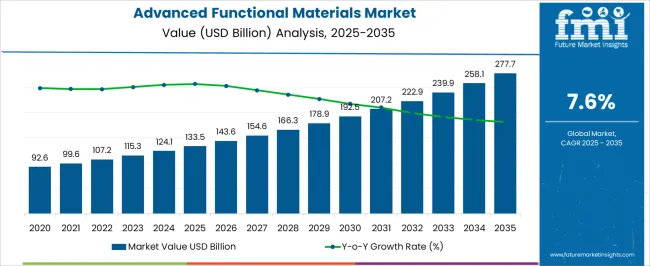
| Metric | Value |
|---|---|
| Advanced Functional Materials Market Estimated Value in (2025 E) | USD 133.5 billion |
| Advanced Functional Materials Market Forecast Value in (2035 F) | USD 277.7 billion |
| Forecast CAGR (2025 to 2035) | 7.6% |
The advanced functional materials market is witnessing significant growth driven by increasing demand for high-performance materials in industries such as electronics, energy, and healthcare. Rising investments in next-generation technologies, including miniaturized electronics, flexible devices, and high-efficiency energy storage systems, are encouraging adoption of advanced materials with superior functional properties. Nanomaterials, composites, and multifunctional polymers are enabling enhanced mechanical, thermal, and electrical performance, which is critical for emerging industrial applications.
The market is also benefiting from continuous innovation in material synthesis, processing techniques, and functionalization methods, which improve product consistency and reliability. Sustainability trends and regulatory focus on energy efficiency and resource optimization are further guiding the development and adoption of advanced functional materials.
The growing integration of smart materials into electrical and electronic systems, coupled with expanding end-use applications in industrial automation and consumer electronics, is expected to sustain long-term market growth Manufacturers are increasingly focusing on developing customized solutions to meet evolving technological and industrial demands, ensuring ongoing expansion of the market.
The advanced functional materials market is segmented by material type, end-user industry, and geographic regions. By material type, advanced functional materials market is divided into Nanomaterials, Ceramics, Composites, Conductive Polymers, Energy Materials, and Other Types. In terms of end-user industry, advanced functional materials market is classified into Electrical and Electronics, Automotive, Healthcare, Aerospace and Defence, Energy and Power (incl. Chemical), and Other End-user Industries. Regionally, the advanced functional materials industry is classified into North America, Latin America, Western Europe, Eastern Europe, Balkan & Baltic Countries, Russia & Belarus, Central Asia, East Asia, South Asia & Pacific, and the Middle East & Africa.
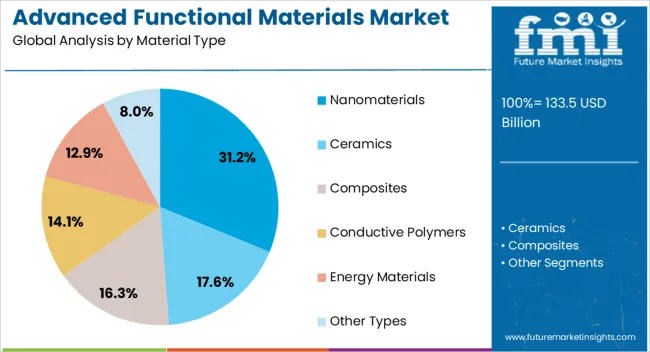
The nanomaterials segment is projected to hold 31.2% of the advanced functional materials market revenue share in 2025, making it the leading material type. This leadership is being supported by the unique properties of nanomaterials, including high surface area, tunable electrical conductivity, and enhanced mechanical strength, which enable superior performance in multiple high-tech applications. Their ability to improve device efficiency, durability, and thermal management is driving adoption in electronics, energy storage, and coating industries.
Continuous advancements in nanoscale synthesis and functionalization techniques are enabling scalable production with consistent quality, further reinforcing their position in the market. Growing industrial interest in miniaturized components, lightweight composites, and high-performance coatings is also supporting demand.
The versatility of nanomaterials, which allows them to be integrated into various substrates and systems, is expanding their applicability across sectors and ensuring they maintain their dominant revenue share Cost-effective production and the ability to meet evolving technical standards are additional factors sustaining the segment’s growth.
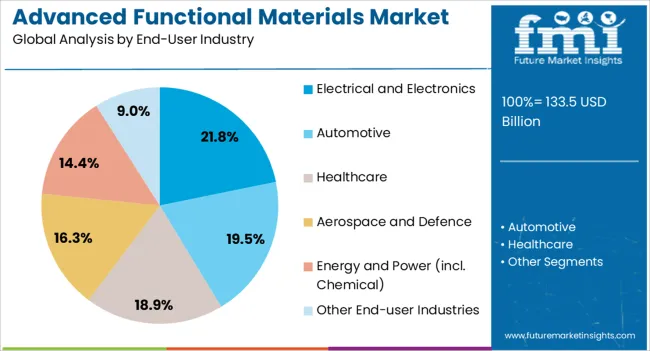
The electrical and electronics end-use industry segment is expected to account for 21.8% of the advanced functional materials market revenue share in 2025, making it the largest end-user category. Its dominance is being driven by increasing incorporation of advanced materials into semiconductors, printed circuit boards, flexible electronics, sensors, and energy storage devices. The segment benefits from the growing need for miniaturized, high-performance, and energy-efficient electronic components, where materials with superior electrical and thermal properties are essential.
Technological advancements in consumer electronics, electric vehicles, and industrial automation are accelerating adoption of functional materials that improve device reliability, longevity, and operational efficiency. Nanomaterials and other high-performance functional materials enable improved signal processing, heat dissipation, and mechanical stability, making them indispensable in modern electronics.
Increasing R&D investments by electronics manufacturers to develop next-generation products and comply with regulatory and sustainability standards are further driving demand The ability of advanced functional materials to deliver high performance while reducing energy consumption is reinforcing their widespread use in the electrical and electronics sector, ensuring the segment maintains its leadership in the market.
A variety of industries demand advanced functional materials, including electrical and electronics, energy and power, automotive, aerospace, and healthcare and pharmaceuticals. In three ways, advanced functional materials reduce the carbon footprint of the component in which they are incorporated They use less energy during the manufacturing process; they have a lower carbon footprint when they are used and recycled.
Due to their exceptional properties, such as high corrosion resistance, melting resistance, bending resistance, and wear and tear resistance, advanced functional materials are becoming an alternative to plastics and metals in various industries. These advanced functional materials are more suitable for mass production.
Furthermore, nanomaterials dominate the AFMs market, as nanomedicine is rapidly taking advantage of nanomaterials in the healthcare industry. Treatment, diagnosis, drug delivery, tracking, and control of biological systems are all possible with nanomedicine.
Moreover, have high electrical properties, keep their physical properties, are chemically inert, and are more heat resistant than plastics and metals. These properties have enabled this material to be used in a wide range of industries, including electrical & electronics, automotive, healthcare, aerospace & defense, energy & power, and others.
Due to increasing investments and aircraft orders, the aerospace and defense industry is expected to grow significantly in the forecast period. In order to support fleet renewal and long-term passenger and air cargo demand growth, carriers will need more than 7,500 new wide-body airplanes by 2040, according to Boeing.
Currently, Asia-Pacific is the largest market for advanced functional materials. These materials are used in the automotive, aerospace, consumer durables, electronics, healthcare, and energy industries. According to estimates, China, India, Japan, and South Korea created the majority of the demand in the region.
China has contributed significantly to global air traffic growth over the past few years due to better air connectivity and higher spending power. As a result, the demand for the aircraft advanced functional materials (AFM) market is expected to increase during the forecast period.
Due to increased spending on aerospace and defense, North America is the second-largest market for advanced functional materials. In this region, the USA spends more on defense than any other country.
In addition to start-ups, government initiatives, and the usage of advanced functional materials in various end-user industries, Europe is the third-largest market for advanced functional materials. Major revenue sources in the region include the UK, France, Germany, and Italy.China, Japan, And Korea To Be The Key Advanced Functional Materials Market
Advanced functional materials offer a huge scope for study, as its horizon encompasses a wide range of products and applications across industries. Functional materials are generally considered to be materials which posses some native functional properties, and not materials with just load bearing capabilities.
The advanced functional materials can be segmented by product types into: advanced functional ceramics, advanced functional composites, nano materials, advanced energy materials, and conductive polymers among others. These functional materials find applications in a host of end user applications.
Advanced functional ceramics are used as components in electronic and electrical devices. Functional ceramics also finds extensive bio-medical applications. Apart from its use in manufacturing of medical devices, it is also used as femoral heads and acetabular cups in the hip replacement procedure. Functional ceramic is also used for dental implants and as scaffolds and bone fillers for tissue engineering.
Advanced ceramic materials play a key role in the development of many fields such as energy and environmental technology, transportation and production technology. Nano materials also have interdisciplinary functions and are used in various applications in different chemicals, materials, electronic products, healthcare, pharmaceuticals, and aerospace industry.
A lot of research has been undertaken to explore other possible applications of nano materials, and the segment is assured of growth in the future.
Functional composites harness the desirable properties of several materials and combine them to produce a new functional material. Functional composites are extensively used in electronics, building and construction, automotive, marine and aerospace applications.
It is also used to manufacture pipes, tanks and other consumer goods. Advanced energy materials refer to the materials which functionally store energy. These materials are used in applications such as batteries, flywheels, solar cells, super capacitors, and high energy density capacitors among others.
This segment has witnessed strong demand due to the advent of portable electronic devices and renewable energy systems. The segment is also expected to grow faster than the industry growth rate with the growth in demand for advanced technologies across the world.
Conductive polymers are organic polymers with the capability to conduct electricity. It is preferred to the metallic conductors, mainly due to their processability through dispersion.
The largest market for advanced functional materials is Asia Pacific region. The demand for the different kinds of functional materials in this region is high due to the presence of manufacturing economies in this region.
Automotive, aerospace, and electronics account for the bulk of the demand. China, India, Japan and South Korea are the main markets in this region. The demand from Asia Pacific was followed by that from North America and Europe. The Asia Pacific market is expected to witness the highest growth.
Advanced functional composites are the largest market by product type. The market can be further sub segmented into metal matrix composites and fiber reinforced plastics by types.
The advanced functional composites can be classified by strengthening mechanism into particle reinforced composite, fiber reinforced composite and dispersion strengthened. The fastest growing segment in advanced functional materials is nano particles, and it is expected to out-perform other functional materials in the foreseeable future.
There are a lot of companies participating in the lucrative market. Some of the big players in advanced functional materials market are 3M Company, Applied Materials, Inc., CNANO Technologies Ltd., Bayer AG, Applied Nanotech Holdings, Inc and Samsung Electro-Mechanics Co., Ltd. among many others.
The research report presents a comprehensive assessment of the market and contains thoughtful insights, facts, historical data, and statistically supported and industry-validated market data. It also contains projections using a suitable set of assumptions and methodologies. The research report provides analysis and information according to categories such as market segments, geographies, types and applications.
The report is a compilation of first-hand information, qualitative and quantitative assessment by industry analysts, inputs from industry experts, and industry participants across the value chain.
The report provides an in-depth analysis of parent market trends, macroeconomic indicators and governing factors, along with market attractiveness within the segments. The report also maps the qualitative impact of various market factors on market segments and various geographies.
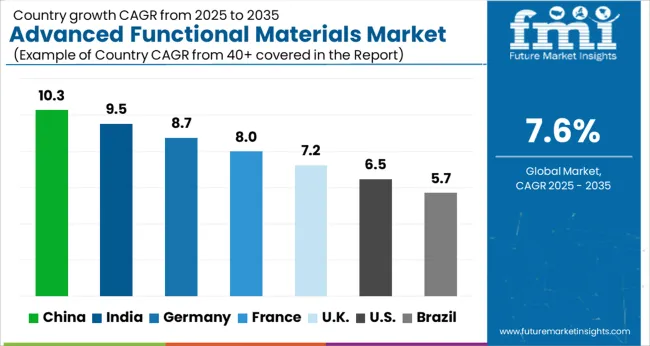
| Country | CAGR |
|---|---|
| China | 10.3% |
| India | 9.5% |
| Germany | 8.7% |
| France | 8.0% |
| UK | 7.2% |
| USA | 6.5% |
| Brazil | 5.7% |
The Advanced Functional Materials Market is expected to register a CAGR of 7.6% during the forecast period, exhibiting varied country level momentum. China leads with the highest CAGR of 10.3%, followed by India at 9.5%. Developed markets such as Germany, France, and the UK continue to expand steadily, while the USA is likely to grow at consistent rates. Brazil posts the lowest CAGR at 5.7%, yet still underscores a broadly positive trajectory for the global Advanced Functional Materials Market. In 2024, Germany held a dominant revenue in the Western Europe market and is expected to grow with a CAGR of 8.7%. The USA Advanced Functional Materials Market is estimated to be valued at USD 47.6 billion in 2025 and is anticipated to reach a valuation of USD 89.0 billion by 2035. Sales are projected to rise at a CAGR of 6.5% over the forecast period between 2025 and 2035. While Japan and South Korea markets are estimated to be valued at USD 7.3 billion and USD 4.1 billion respectively in 2025.
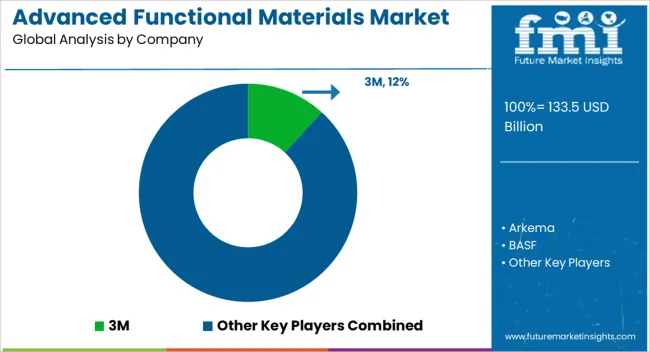
| Item | Value |
|---|---|
| Quantitative Units | USD 133.5 Billion |
| Material Type | Nanomaterials, Ceramics, Composites, Conductive Polymers, Energy Materials, and Other Types |
| End-User Industry | Electrical and Electronics, Automotive, Healthcare, Aerospace and Defence, Energy and Power (incl. Chemical), and Other End-user Industries |
| Regions Covered | North America, Europe, Asia-Pacific, Latin America, Middle East & Africa |
| Country Covered | United States, Canada, Germany, France, United Kingdom, China, Japan, India, Brazil, South Africa |
| Key Companies Profiled | 3M, Arkema, BASF, CeramTec GmbH, Covestro AG, Dow, Evonik Industries AG, Hexcel Corporation, Huntsman International LLC, JCBL Group, Kyocera Corporation, LG Chem, Morgan Advanced Materials, Resonac Holdings Corporation, SGL Carbon, Sumitomo Chemical Co., Ltd., Mitsubishi Chemical Group Corporation, and TORAY INDUSTRIES, INC. |
The global advanced functional materials market is estimated to be valued at USD 133.5 billion in 2025.
The market size for the advanced functional materials market is projected to reach USD 277.7 billion by 2035.
The advanced functional materials market is expected to grow at a 7.6% CAGR between 2025 and 2035.
The key product types in advanced functional materials market are nanomaterials, ceramics, composites, conductive polymers, energy materials and other types.
In terms of end-user industry, electrical and electronics segment to command 21.8% share in the advanced functional materials market in 2025.






Our Research Products

The "Full Research Suite" delivers actionable market intel, deep dives on markets or technologies, so clients act faster, cut risk, and unlock growth.

The Leaderboard benchmarks and ranks top vendors, classifying them as Established Leaders, Leading Challengers, or Disruptors & Challengers.

Locates where complements amplify value and substitutes erode it, forecasting net impact by horizon

We deliver granular, decision-grade intel: market sizing, 5-year forecasts, pricing, adoption, usage, revenue, and operational KPIs—plus competitor tracking, regulation, and value chains—across 60 countries broadly.

Spot the shifts before they hit your P&L. We track inflection points, adoption curves, pricing moves, and ecosystem plays to show where demand is heading, why it is changing, and what to do next across high-growth markets and disruptive tech

Real-time reads of user behavior. We track shifting priorities, perceptions of today’s and next-gen services, and provider experience, then pace how fast tech moves from trial to adoption, blending buyer, consumer, and channel inputs with social signals (#WhySwitch, #UX).

Partner with our analyst team to build a custom report designed around your business priorities. From analysing market trends to assessing competitors or crafting bespoke datasets, we tailor insights to your needs.
Supplier Intelligence
Discovery & Profiling
Capacity & Footprint
Performance & Risk
Compliance & Governance
Commercial Readiness
Who Supplies Whom
Scorecards & Shortlists
Playbooks & Docs
Category Intelligence
Definition & Scope
Demand & Use Cases
Cost Drivers
Market Structure
Supply Chain Map
Trade & Policy
Operating Norms
Deliverables
Buyer Intelligence
Account Basics
Spend & Scope
Procurement Model
Vendor Requirements
Terms & Policies
Entry Strategy
Pain Points & Triggers
Outputs
Pricing Analysis
Benchmarks
Trends
Should-Cost
Indexation
Landed Cost
Commercial Terms
Deliverables
Brand Analysis
Positioning & Value Prop
Share & Presence
Customer Evidence
Go-to-Market
Digital & Reputation
Compliance & Trust
KPIs & Gaps
Outputs
Full Research Suite comprises of:
Market outlook & trends analysis
Interviews & case studies
Strategic recommendations
Vendor profiles & capabilities analysis
5-year forecasts
8 regions and 60+ country-level data splits
Market segment data splits
12 months of continuous data updates
DELIVERED AS:
PDF EXCEL ONLINE
Advanced Process Control Market Size and Share Forecast Outlook 2025 to 2035
Advanced Active Cleaning System for ADAS Market Forecast and Outlook 2025 to 2035
Advanced Driver Assistance System (ADAS) Testing Equipment Market Size and Share Forecast Outlook 2025 to 2035
Advanced Lead Acid Battery Market Size and Share Forecast Outlook 2025 to 2035
Advanced Energy Storage System Market Size and Share Forecast Outlook 2025 to 2035
Advanced Gear Shifter System Market Size and Share Forecast Outlook 2025 to 2035
Advanced Therapeutics Pharmaceutical Outsourcing Market Size and Share Forecast Outlook 2025 to 2035
Advanced Airport Technologies Market Size and Share Forecast Outlook 2025 to 2035
Advanced Air Mobility Market Size and Share Forecast Outlook 2025 to 2035
Advanced Sensor Market Size and Share Forecast Outlook 2025 to 2035
Advanced Combat Helmet Market Size and Share Forecast Outlook 2025 to 2035
Advanced Optics Material Market Size and Share Forecast Outlook 2025 to 2035
Advanced Drill Data Management Solutions Market Size and Share Forecast Outlook 2025 to 2035
Advanced Water Management And Filtration Equipment Market Size and Share Forecast Outlook 2025 to 2035
Advanced Coating Market Size and Share Forecast Outlook 2025 to 2035
Advanced Aerospace Coatings Industry Analysis in Europe - Size, Share, and Forecast 2025 to 2035
Advanced Tires Market Size and Share Forecast Outlook 2025 to 2035
Advanced Therapy Medicinal Products Market Size and Share Forecast Outlook 2025 to 2035
Advanced Glass Market Size and Share Forecast Outlook 2025 to 2035
Advanced Server Energy Monitoring Tools Market Size and Share Forecast Outlook 2025 to 2035

Thank you!
You will receive an email from our Business Development Manager. Please be sure to check your SPAM/JUNK folder too.
Chat With
MaRIA